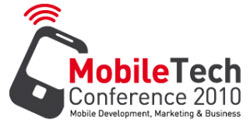 I had the great honor to give one of the three keynotes at this year’s MobileTechConference – besides Microsoft and Google. The subject of my talk was “Augmented Reality – From Science Fiction to Mass Medium”. It covered the current state of Mobile AR, sketched out the different pieces of technology that will make their way into the industry and pointed out how they will possibly play together very soon. Besides all the fancy tech we talked about the business side of Mobile Augmented Reality and shed some light on what is driving the different players in the industry and their business cases.
I had the great honor to give one of the three keynotes at this year’s MobileTechConference – besides Microsoft and Google. The subject of my talk was “Augmented Reality – From Science Fiction to Mass Medium”. It covered the current state of Mobile AR, sketched out the different pieces of technology that will make their way into the industry and pointed out how they will possibly play together very soon. Besides all the fancy tech we talked about the business side of Mobile Augmented Reality and shed some light on what is driving the different players in the industry and their business cases.
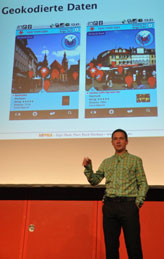 Currently most of the applications in Mobile AR are still about the “where is?” paradigm. Where is the next ATM? Where is the next good restaurant? Where is the next gas station? This is good for tech showcases but the problem with this kind of application is: it can easily and better be done with a map. And this is critical.
Currently most of the applications in Mobile AR are still about the “where is?” paradigm. Where is the next ATM? Where is the next good restaurant? Where is the next gas station? This is good for tech showcases but the problem with this kind of application is: it can easily and better be done with a map. And this is critical.
For Augmented Reality to ramp of we need to rethink the way we represent content in this new medium. Augmented Reality is about creating immersive 3D experiences, that you can actually walk through and experience in terms of real world characteristics like size, amount, color and interaction.
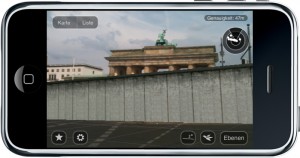 The Berlin Wall 3D serves as a good example of an interactive, realtime, 3D augmented reality experience. It gives you this idea of what the wall was like, how it obstructed your view and how it actually crippled the very central places in Berlin like Potsdamer Platz and the area around Brandenburg Gate and the Reichstag. This kind of immediate real world like experience can not be reproduced with a photo, a video and specifically not with a map.
The Berlin Wall 3D serves as a good example of an interactive, realtime, 3D augmented reality experience. It gives you this idea of what the wall was like, how it obstructed your view and how it actually crippled the very central places in Berlin like Potsdamer Platz and the area around Brandenburg Gate and the Reichstag. This kind of immediate real world like experience can not be reproduced with a photo, a video and specifically not with a map.
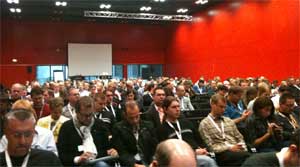 Based on the technology available today there are a couple approaches out there to work on the major weak point of Mobile Augmented Reality: location tracking. This is currently done utilizing GPS and compass. The good thing is that these technologies are widely available and relatively cheap to deploy. However they are pretty inaccurate. Technologies like point could models and Parallel Tracking and Mapping might be the future solution to this problem.
Based on the technology available today there are a couple approaches out there to work on the major weak point of Mobile Augmented Reality: location tracking. This is currently done utilizing GPS and compass. The good thing is that these technologies are widely available and relatively cheap to deploy. However they are pretty inaccurate. Technologies like point could models and Parallel Tracking and Mapping might be the future solution to this problem.
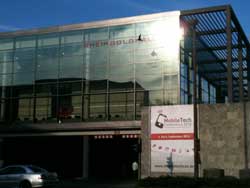 The MobileTechConference was held in the Rheingoldhalle, Mainz, and organized by Software & Support Media. It was the first of it’s kind in Germany and a great success with 450 guests, dozends of speakers and five parallel tracks “Android”, “iPhone & iPad”, “Mobile Business & Trends”, “Mobile Platforms” and “Mobile Web & Widgets”. I specifically enjoyed the friendly and inspiring atmosphere that invited for interesting talks. Find a conference wrapup here.
The MobileTechConference was held in the Rheingoldhalle, Mainz, and organized by Software & Support Media. It was the first of it’s kind in Germany and a great success with 450 guests, dozends of speakers and five parallel tracks “Android”, “iPhone & iPad”, “Mobile Business & Trends”, “Mobile Platforms” and “Mobile Web & Widgets”. I specifically enjoyed the friendly and inspiring atmosphere that invited for interesting talks. Find a conference wrapup here.








